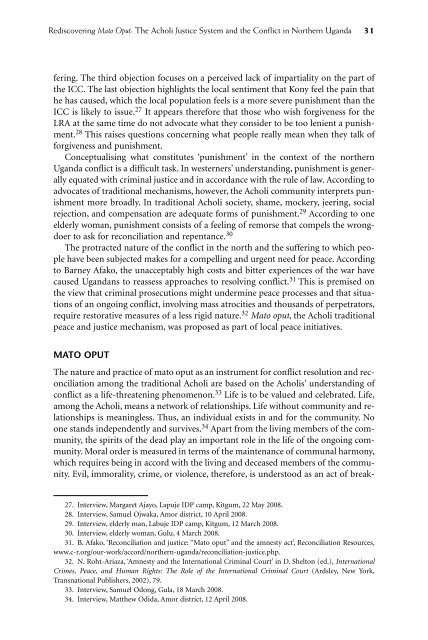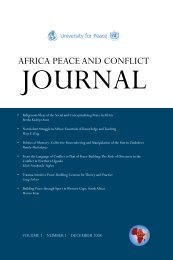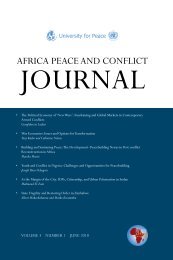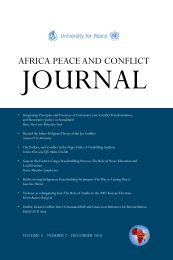Download - Africa Peace and Conflict Journal - The University for ...
Download - Africa Peace and Conflict Journal - The University for ...
Download - Africa Peace and Conflict Journal - The University for ...
Create successful ePaper yourself
Turn your PDF publications into a flip-book with our unique Google optimized e-Paper software.
Rediscovering Mato Oput: <strong>The</strong> Acholi Justice System <strong>and</strong> the <strong>Conflict</strong> in Northern Ug<strong>and</strong>a 31fering. <strong>The</strong> third objection focuses on a perceived lack of impartiality on the part ofthe ICC. <strong>The</strong> last objection highlights the local sentiment that Kony feel the pain thathe has caused, which the local population feels is a more severe punishment than theICC is likely to issue. 27 It appears there<strong>for</strong>e that those who wish <strong>for</strong>giveness <strong>for</strong> theLRA at the same time do not advocate what they consider to be too lenient a punishment.28 This raises questions concerning what people really mean when they talk of<strong>for</strong>giveness <strong>and</strong> punishment.Conceptualising what constitutes ‘punishment’ in the context of the northernUg<strong>and</strong>a conflict is a difficult task. In westerners’ underst<strong>and</strong>ing, punishment is generallyequated with criminal justice <strong>and</strong> in accordance with the rule of law. According toadvocates of traditional mechanisms, however, the Acholi community interprets punishmentmore broadly. In traditional Acholi society, shame, mockery, jeering, socialrejection, <strong>and</strong> compensation are adequate <strong>for</strong>ms of punishment. 29 According to oneelderly woman, punishment consists of a feeling of remorse that compels the wrongdoerto ask <strong>for</strong> reconciliation <strong>and</strong> repentance. 30<strong>The</strong> protracted nature of the conflict in the north <strong>and</strong> the suffering to which peoplehave been subjected makes <strong>for</strong> a compelling <strong>and</strong> urgent need <strong>for</strong> peace. Accordingto Barney Afako, the unacceptably high costs <strong>and</strong> bitter experiences of the war havecaused Ug<strong>and</strong>ans to reassess approaches to resolving conflict. 31 This is premised onthe view that criminal prosecutions might undermine peace processes <strong>and</strong> that situationsof an ongoing conflict, involving mass atrocities <strong>and</strong> thous<strong>and</strong>s of perpetrators,require restorative measures of a less rigid nature. 32 Mato oput, the Acholi traditionalpeace <strong>and</strong> justice mechanism, was proposed as part of local peace initiatives.MATO OPUT<strong>The</strong> nature <strong>and</strong> practice of mato oput as an instrument <strong>for</strong> conflict resolution <strong>and</strong> reconciliationamong the traditional Acholi are based on the Acholis’ underst<strong>and</strong>ing ofconflict as a life-threatening phenomenon. 33 Life is to be valued <strong>and</strong> celebrated. Life,among the Acholi, means a network of relationships. Life without community <strong>and</strong> relationshipsis meaningless. Thus, an individual exists in <strong>and</strong> <strong>for</strong> the community. Noone st<strong>and</strong>s independently <strong>and</strong> survives. 34 Apart from the living members of the community,the spirits of the dead play an important role in the life of the ongoing community.Moral order is measured in terms of the maintenance of communal harmony,which requires being in accord with the living <strong>and</strong> deceased members of the community.Evil, immorality, crime, or violence, there<strong>for</strong>e, is understood as an act of break-27. Interview, Margaret Ajayo, Lapuje IDP camp, Kitgum, 22 May 2008.28. Interview, Samuel Ojwaka, Amor district, 10 April 2008.29. Interview, elderly man, Labuje IDP camp, Kitgum, 12 March 2008.30. Interview, elderly woman, Gulu, 4 March 2008.31. B. Afako, ‘Reconciliation <strong>and</strong> justice: “Mato oput” <strong>and</strong> the amnesty act’, Reconciliation Resources,www.c-r.org/our-work/accord/northern-ug<strong>and</strong>a/reconciliation-justice.php.32. N. Roht-Ariaza, ‘Amnesty <strong>and</strong> the International Criminal Court’ in D. Shelton (ed.), InternationalCrimes, <strong>Peace</strong>, <strong>and</strong> Human Rights: <strong>The</strong> Role of the International Criminal Court (Ardsley, New York,Transnational Publishers, 2002), 79.33. Interview, Samuel Odong, Gula, 18 March 2008.34. Interview, Matthew Odida, Amor district, 12 April 2008.






